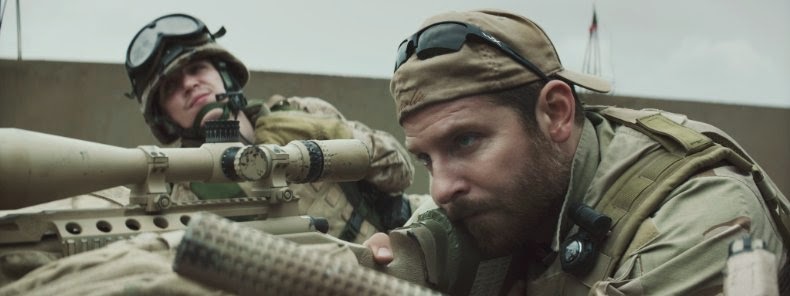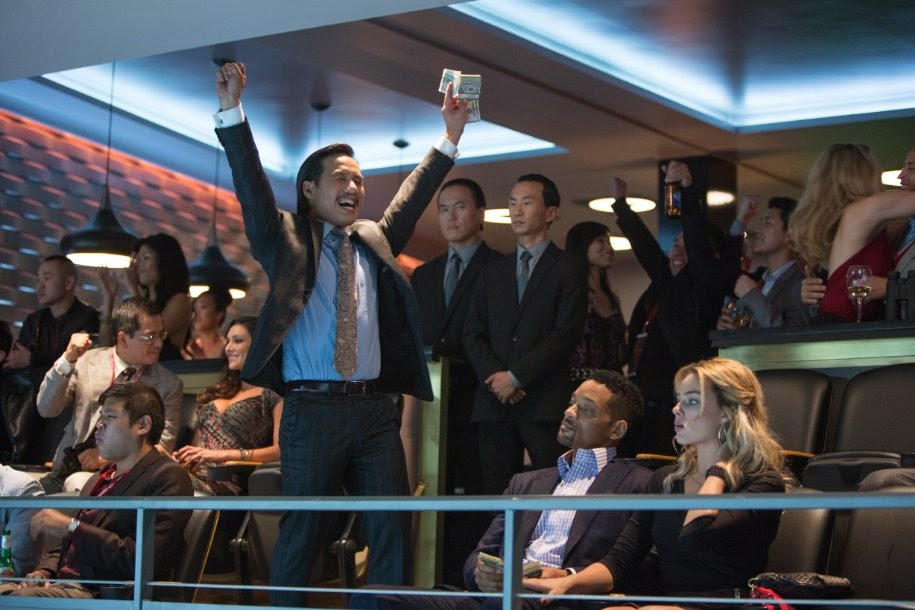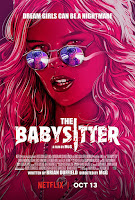American Sniper
American Sniper
(2015)
A Review by Grant Kanigan
Directed by: Clint Eastwood
Written by: Jason Hall, based on Chris Kyle's
autobiography with help from Scott McEwen
and James Defelice
Starring: Bradley Cooper, Sienna Miller
Rating: 14A
Release Date: January 16th, 2015
 |
| Bradley Cooper and Kyle Gallner in American Sniper © Warner Bros. Pictures |
American Sniper is the story of Kyle's life from the start of his time in the Navy SEALS. Finding his life uneventful and unfulfilled in his early thirties, Kyle joins the military right before the 9/11 terrorist attacks. While never fighting in Afghanistan, the attacks gave him increased motivation for going overseas. He eventually completed four tours in Iraq, "with a hundred and sixty confirmed kills," making him "one of the deadliest snipers in American history." The film follows Kyle through these tours, and his home life between. At face value, it's a simple story, yet Cooper's performance and Eastwood's strong direction give it heft; the cinematography is at times dazzling and wide open during the quieter scenes, and claustrophobic and gritty when the film gets violent. It becomes a reflection of Kyle's psyche in some ways, representing the disorientation of battle. While the film has the urgency of Eastwood's previous works, the often hyper-kinetic battle scenes show a side of Eastwood's visual creativity that hasn't been seen before. These explosive scenes ultimately move the film at lighting speed towards it's conclusion, making the 134 minute run time feel like the blink of an eye. However, it's scenes of moral uncertainty that stop the action and demand attention from the viewer.
Chris Kyle, author of American Sniper: The Autobiography of the Most Lethal Sniper in US History upon which Eastwood's film is based, had a far more polarizing world-view than most. The New Yorker's Nicholas Schmidle quotes* Kyle as expressing his hatred of Iraqi's because "he 'hated the damn savages**' he was fighting." Kyle was also deeply religious, having "tattooed one of his arms with a red crusader's cross, wanting 'everyone to know I was a Christian,' " and that "I don't shoot people with Korans. I'd like to, but I don't," suggesting an angst towards those who didn't share his beliefs. The article states he saw himself as "a cross between a lawman and an executioner," who modelled himself after the "Punisher - A Marvel Comics character who wages a 'one-man war upon crime'" against those the courts were too afraid to punish. While the article states that Kyle did suffer from post-traumatic stress disorder, (PTSD), which deprives the body of the sleep that is "fuel for the frontal lobes of the brain, which handle ethical and emotional self-restraint," that's still a weak excuse for violent and xenophobic behaviour. Yet, Eastwood doesn't shy away from these disturbing traits.
War is never a good thing. It's a last resort that's used when all other options have been exhausted. Sometimes, it's necessary, like when the powers that be intervened and stopped the Nazi's from completing their dangerous and racist Final Solution. As well, sometimes an attack, like Pearl Harbour or 9/11 warrant a quick and violent response. Much of the world still operates on the "eye for an eye" principle, especially when an enemy is trying to take another eye. The military is a tool, that, much like the atomic bomb, is quick and ruthless, and has to be used with discretion. In today's world, it still sadly remains necessary; optimism tells me that world peace is achievable, cynicism tells me that evil is a fact of human nature - it will always exist. Soldiers are the fuel that the military operates on - without them the military is nothing. While I don't agree with every war that has been fought, I respect every soldier that has fought in war, and realize that most of the time, it's where humanity, and decency go to die. Eastwood illustrates that. A pivotal scene in American Sniper has Kyle's sniper trained on a mother and a six year old child. Upon discovering they're holding a bomb, Kyle has to make the quick decision to either kill the child or let the child kill the troops of soldiers he's trying to protect. It's ultimately a 'sophie's choice,' an impossible decision, yet Kyle chooses in the moment to act, and saves the lives of his troops. This is ultimately reflective of his entire time spent in the war. He killed hundreds of people, but it was in the name of saving his country.
American Sniper is not propaganda and in no way glorifies the horrors of war. It is a tough, violent and disturbing film. Originally I was going to compare American Sniper to Lone Survivor and say that Lone Survivor was a better war film because it showed that Americans and Afghani`s can both fight against the evils of Al Qaeda. Yet, American Sniper gets the upper hand. Chris Kyle is a polarizing figure, and maybe that's the point of Eastwood's film. War isn't cut and dry, and heroes aren't always inherently obvious. Yet, Eastwood shows a struggle that everyone who participates in war goes through - post traumatic stress, survivor's guilt, and a need to completely wipe out the terrors that you experienced. Chris Kyle, at least, attempted to help veterans who were wounded both physically and mentally when he returned home, and made a lasting impact. The reason American Sniper is making so many people uncomfortable is because it shows what Eastwood has always known - there's no glory in killing - it's a hell of a thing, killing a man.
Grant's Rating: 5/5 Stars
Sienna Miller and Bradley Cooper in American Sniper: "Come Home, We Need You"
*This review quoted heavily from the New York Times article "In the Crosshairs" by Nicholas Schmidle, which can be viewed here. Any direct references from the article are in quotes, and the full citation is below:
Schmidle, Nicholas. "In The Crosshairs." The New Yorker. Condé Nast, June-July 2013. Web. 25 Jan. 2015. <http://www.newyorker.com/magazine/2013/06/03/in-the-crosshairs>.
Schmidle, Nicholas. "In The Crosshairs." The New Yorker. Condé Nast, June-July 2013. Web. 25 Jan. 2015. <http://www.newyorker.com/magazine/2013/06/03/in-the-crosshairs>.
**'savages' has an extremely ugly and xenophobic etymology, which is discussed here, and although it references Africans instead of Iraqis, the larger points are wholly applicable.



Comments